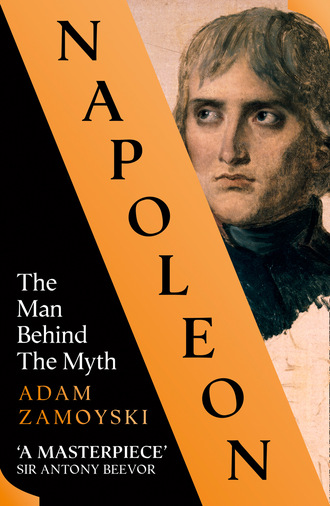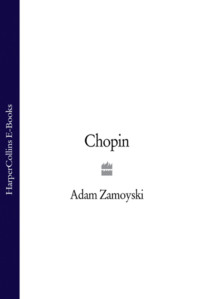
Полная версия
Napoleon
Paoli admitted to Boswell that he placed great trust in Providence. That, and the praise being directed at him from various parts of Europe, had lulled him into a state of complacency. He believed that the British, who had taken an interest in supporting the Corsican cause before, and were now in thrall to Boswell’s An Account of Corsica, would come to his aid if he were threatened. By the same token France could not countenance the possibility of the strategically important island falling into the hands of a hostile power. Still smarting from overseas losses to Britain during the recently ended Seven Years’ War, French wounded pride would welcome the balsam of a colonial gain. Genoa had given up on Corsica, and owed France a great deal of money. By the Treaty of Versailles of May 1768 it ceded the island to France, pending the repayment of the overdue debt. French troops moved out of their coastal bases to impose the authority of King Louis XV.7
Paoli issued a call to arms, but his was a lost cause, though the men of the uplands put up a stiff resistance, inflicting heavy casualties on the French. Carlo was at Paoli’s side during the decisive engagement at Ponte-Novo on 8 May 1769, but did not take part in the fighting; Paoli hovered some three kilometres away as his men were routed by a superior French force under the comte de Vaux. Paoli fled over the mountains to Porto Vecchio, whence two British frigates took him and a handful of supporters off to exile in England.8
Carlo Buonaparte was not among them. Family legend has it that Paoli insisted he stay behind in Corsica, but it is more likely that Carlo made the decision himself. The island had never entirely submitted to any regime, and among its inhabitants family came a long way before loyalty to any cause. While Carlo and his uncle Napoleone had served Paoli, his other uncle Luciano had remained in French-held Ajaccio, where he had sworn fealty to the King of France, as had most of the notables of the coastal cities. Unperturbed by the cause of independence, Letizia was writing to her grandfather Giuseppe Maria Pietrasanta in French-held Bastia asking him to send her bales of Lyon silk and new dresses fit for a noblewoman.9
‘I was a good patriot and a Paolist in my heart as long as the national government lasted,’ Carlo wrote. ‘But this government has ceased to exist. We have become French. Eviva il Re e suo governo.’ Having submitted to Vaux, he went back to Ajaccio. On the way home over the mountains, Carlo almost lost his wife and the child she was carrying in her womb when her mule stumbled in the torrent of the river Liamone.10
The child was born on the night of 15 August 1769, and named after his great-uncle Napoleone, who had died two years before. The name did not figure in the liturgical calendar as belonging to a saint, but it was not unknown in Genoa and Corsica, where it was sometimes spelt Nabullione or even Lapullione, and had been given to several members of the family in the past. He would not be christened until July 1771, by which time his father had repositioned himself with considerable skill.11
Since the legal profession was the key to obtaining civic office under any government, Carlo set off for Pisa to obtain the necessary qualifications. ‘One can have no idea of the facility with which the title of doctor is granted here,’ wrote a contemporary French traveller of the university of Pisa. ‘Everyone in the locality is one, even the inn-keepers and post-masters.’ Carlo presented a hastily-written thesis for which he obtained a doctorate, and within six weeks he was back in Ajaccio, where he found no shortage of work.12
With a population of 3,907 according to the French census of 1770, Ajaccio was the second largest city in Corsica, but it was in essence a sleepy, smelly village. When Balzac visited it more than half a century later he was stunned by the ‘unbelievable indolence’ pervading the place, with the menfolk wandering about all day smoking. It consisted of a minuscule citadel stuck out on the promontory shielding the port, and behind it a walled town not more than 250 metres across in any direction, clustered around three radiating streets intersected by another three narrower ones, with an attractive promenade and square between the two named the Olmo after a large elm that grew on it. Within the walls there was a cathedral whose roof fell in in 1771 and would not be repaired for twenty years, and which was unusable in summer due to the stink emanating from the dead buried under its floor. There was also a Jesuit college and a governor’s residence, tucked into an assortment of mean-looking townhouses ranged along narrow streets bordered by small shops whose trade spilled out onto them. The smell of fish drifting over from the harbour mingled with that of the hides put out to dry by the butchers cutting up carcases in the street and the stench from the moat of the citadel. Outside the city walls stood a convent, a hospital, a military barracks and a seminary, and, along the road leading up to the town from the north, an agglomeration of dwellings known as the Borgo, where the poorer inhabitants lived.13
The city was dominated by families such as the Ponte, Pozzo di Borgo, Bacciochi and the Peraldi, and an oligarchy of notaries, lawyers and clerics with ‘noble’ connections such as the Buonaparte. This society was supplemented by the magistrates, judge, officers and other officials of the French administration. The houses within the city walls were mostly divided by multiple ownership like the Buonaparte home, and, since all their inhabitants were related to each other by blood or marriage, the whole area was a familial congeries connected by tangled ties. Ajaccio’s lawyers, Carlo among them, thrived on the squabbles generated by the resulting disputes over restricted space and scant resources. Carlo himself would be engaged for many years in a legal battle over some used wine-making equipment and a few leaky barrels. In one case, he pleaded for a client over one kerchief. There was plenty of work, but it was not remunerative enough or commensurate with Carlo’s ambitions. On the basis of his doctorate, in 1771 he obtained a minor post at the court of Ajaccio, but he was aiming higher.14
He had wasted no time in seeking the favour of the French military governor of the south-west of the island, the comte de Narbonne. On being fobbed off, he offered his services to Narbonne’s superior in Bastia. Charles Louis, comte de Marbeuf, needed a party of supporters among the notables of Ajaccio, and the Buonaparte were ideally placed to provide it. Their collaboration developed so well that Carlo felt bold enough to invite Marbeuf to stand godparent at the christening of his son Napoleone on 21 July 1771, and Marbeuf agreed. In the event Marbeuf was prevented from attending, so he sent a Genoese patrician and later royal lieutenant at Ajaccio, Lorenzo Giubega, to act as proxy. Marbeuf did come to Ajaccio less than a month later for the festivities of the feast of the Assumption and the little Napoleone’s second birthday on 15 August. He was so struck by the beauty of the child’s mother that he insisted she take his arm on the afternoon passegiata up and down the Olmo, and after walking her home he stayed there until one in the morning. Carlo’s ambitions soared.15
France was interested in Corsica both for its strategic importance and for its economic potential. It was accorded the status of a semi-autonomous province within the kingdom, and the French authorities set about organising it. A survey revealed to them the idiosyncratic nature of Corsican society, with its broad base of land tenure and plethora of hunting, gathering and fishing rights and obligations. These would hinder rationalisation, while the egalitarianism that had so enchanted Boswell and Rousseau impeded not only progress but the establishment of a hierarchy necessary for successful political control. One of the first actions of the new French regime was to correct this by recognising as noble the most prominent families. In large measure thanks to the usefulness of Carlo and the charms of his wife, the Buonaparte were included. ‘Ajaccio is struck with astonishment and filled with jealousy by the news,’ Carlo wrote to his wife’s grandfather.16
The connection with Marbeuf was invaluable. In 1772 Carlo was elected to represent Ajaccio in the newly established Assembly of Corsican Estates only because Marbeuf intervened to have his successful rival’s election annulled. The governor’s direct intercession also helped resolve a lengthy court battle between the Buonaparte and their Ornano cousins over a dowry that included a significant part of the house in which they lived. By way of a series of buy-outs, swaps and court cases Carlo would extend his possession over the years against a backdrop of running battles between the various members of the family involving the use of the staircase and other areas where interests clashed. These occasionally flared into violence, and inevitably ended up in court, where the knowledge that Carlo had the backing of Marbeuf counted.17
The rise of Carlo’s fortunes and the governor’s interest in Letizia aroused jealousy and gave rise to gossip. Marbeuf, a widower, did have an official mistress in Bastia, a Madame Varese, but whatever charms she may have possessed, at fifty she was past her prime, while Letizia was still young. It is difficult to see any reason other than an amorous one for him to spend time with an uneducated woman forty years his junior, and he gave every sign of being besotted by Letizia. There is no evidence that the relationship was sexual, but it was widely believed that it was, and that her son Louis, born in 1778, was his.18
Letizia would bear a total of thirteen children, of whom three died young and two in childbirth. The first surviving child was Joseph, born in 1768, the next Napoleone, born in 1769. As his mother was unable to feed him, he was provided with a wet-nurse, Camilla Carbon Ilari, who grew so fond of him that she neglected her own son. Napoleone and his elder brother, christened Joseph but known as Giuseppe, were also spoiled by their father and their grandmother Saveria Paravicini, known in the family as Minanna. But they were kept under strict control by Letizia. Strong, brave and characterful, Letizia was endowed with common sense. Unlike the rest of her family she was pious, and hardly went out other than to church. She was also a strict disciplinarian, administering slaps to all her children, and once giving Napoleone a thrashing which he remembered to the end of his life. She exerted a strong influence on him, and he would later say that he owed everything to her.19
There is no evidence that Napoleone ever attended school, although according to his mother he did go to lessons at a girls’ school. He was probably taught to read at home by a local priest, the Abbé Recco – presumably in Latin rather than the local patois they all spoke. His great-uncle Luciano, effective head of the family, must have found other teachers, as Napoleone from an early age showed an almost obsessive interest in, and remarkable aptitude for, mathematics.20
His seems to have been a happy childhood, much of it spent in the street playing with various cousins, while the summers were passed up in the hills at Bocognano. The family grew, with the birth of a boy, Luciano, in 1775, and a girl, the fourth to be christened Maria-Anna and the first to survive, in 1777. While most of the anecdotes collected by early biographers can be dismissed as ‘remembered’ under the suggestive influence of the boy’s later trajectory, one thing can be retained. His mother admiringly reminisced that of all her children Napoleone had been ‘the most intrepid’. In fact, he seems to have been aggressive and quarrelsome, leading to frequent fights with his elder brother.21
There was violence all around him, since much of the population continued in its lawless ways, and in order to stamp out the remaining resistance and the inherent banditry, the French applied the harshest measures. Mobile columns scoured the countryside burning down the houses and crops and slaughtering the flocks of suspected rebels, breaking them on the wheel and hanging the corpses on public highways as a warning. The five-year-old boy could not have avoided seeing them.
Whatever his feelings, Carlo had tied his family’s fortunes to the French regime and its representative in Corsica. Being thought a cuckold was a small price to pay for the benefits brought by Marbeuf’s favour, which he drew on at every upward step. While Luciano saved every penny and literally slept on his money-bags, Carlo spent lavishly, dressing well in order to keep up appearances when he attended the assembly in Bastia or other official functions. Having gained recognition of his status as a Corsican nobleman, he was determined to propel himself into the French nobility, as only that opened the door to careers in the kingdom. It had been decided that his elder son, Joseph, would go into the Church and Napoleone into the army. Marbeuf’s nephew was the bishop of Autun, in eastern France, and Joseph was easily secured a place at the city’s seminary, with the position of a sub-deacon and a stipend lined up for him.
Placing Napoleone would be more difficult. In 1776 Carlo applied for a place at one of the royal military academies, but the boy would require a royal bursary to pay for his studies. These were awarded to sons of officers and indigent nobles, so Carlo had to prove his noble credentials and provide evidence of his lack of means. The recognition of nobility he had gained in 1771 was based on proofs dating back only 200 years, which was not sufficient. In 1777 Carlo was chosen as one of the deputies to represent the nobility of Corsica at the court of Louis XVI, but he would not be presented to the king unless he could provide proofs of more ancient lineage.
When he had gone to Pisa to obtain his doctorate, Carlo had obtained from the city’s archbishop a document attesting that his birth entitled him to the status of a ‘noble patrician of Tuscany’. He now returned to Tuscany and located a canon by the name of Filipo Buonaparte, who provided him with documents purportedly relating him to his own family, which could trace noble status back to the fourteenth century. Armed with these, Carlo hoped to be able to gain recognition in France, and with it the right to a bursary for Napoleone.22
On 12 December 1778 Carlo left Ajaccio, accompanied by Letizia and their sons Joseph and Napoleone. The party also included two other young men. One was Letizia’s half-brother Giuseppe Fesch. When her father had died soon after Letizia’s birth her mother had remarried a Swiss naval officer in Genoese service and produced a son. Giuseppe Fesch had been awarded a bursary to study for the priesthood at the seminary of Aix-en-Provence. The other young man was Abbé Varese, a cousin of Letizia who, like Joseph, had been granted the post of sub-deacon at the cathedral of Autun. They travelled by cart and mule via Bocognano to Corte, where a carriage sent by Marbeuf waited to conduct Letizia in greater comfort on the rest of their journey to Bastia. From there, Carlo and the four boys sailed for Marseille while Letizia moved into Marbeuf’s residence.23
They reached Autun on 30 December, having left Fesch at Aix on the way. On 1 January 1779 Joseph and Napoleone entered the college of Autun, the first to prepare for the priesthood, the second in order to learn French. He would spend three months and twenty days at the college, whose thirty boarders were taught by priests of the Oratorian order. During that time he would learn French well enough to carry on a conversation and to write a simple essay, but he did not, then or ever, learn the language well, and his grammar and use of words remained poor. His handwriting never developed beyond an ugly scrawl.24
Carlo travelled on to Paris, where he learned that Napoleone had been deemed eligible for a bursary, subject to the submission of the necessary proofs of nobility. He duly presented these, before joining the other Corsican deputies to be presented to the king at Versailles. On 9 March the three Corsicans were admitted into the royal presence, bowed low and handed their petition to the monarch, who handed it to an attendant minister and graciously watched them leave his presence, stepping backwards and bowing repeatedly. They were then presented to the queen, the dauphin and various dignitaries, after which they were driven around the park in a carriage and rowed up and down the grand canal before being allowed to depart.25
On 28 March the minister of war, the prince de Montbarrey, officially informed Carlo that his son had been admitted with a royal bursary to the military academy of Brienne. As he could not leave Versailles, Carlo asked the father of another boy due to be transferred from Autun to Brienne to take Napoleone there. On 21 April, after an emotional farewell to Joseph, the nine-year-old Napoleone set off on his military career.26
3
Boy Soldier
Napoleone arrived at the military academy of Brienne on 15 May 1779, three months short of his tenth birthday. The regulation kit each boy brought with him consisted of: three pairs of bed-sheets; a set of dining silver and a silver goblet, engraved with his family arms or initials; a dozen napkins; a blue coat with white metal buttons bearing the arms of the academy; two pairs of black serge breeches; twelve shirts, twelve kerchiefs, twelve white collars, six cotton caps, two dressing gowns, a hair-powder pouch and a hair ribbon. The powder and ribbon would be redundant for the first three years, as up to the age of twelve the boys wore their hair close-cropped.1
The academy occupied an inelegant sprawl of buildings in the small town of 400 people, dominated by the château of the Loménie de Brienne family (to whom Marbeuf had recommended the boy). It had some 110 pupils, about fifty of them beneficiaries of royal bursaries like Napoleone. It was an austere institution, run by friars of the Order of Minims, founded in the fifteenth century by St Francis de Paola in Calabria and dedicated to abstention and frugality, so the atmosphere was Spartan. The boys attended mass every morning and discipline was strict, although there was no corporal punishment. At night they were locked in cells furnished with a straw-filled mattress, blanket, ewer and basin. In order to teach them to do without servants, they had to look after themselves and their kit. There were no holidays, and they were only allowed home in exceptional circumstances.2
Following the defeats in the Seven Years’ War, thought to have been partly due to the dilettantism of the officers, French military thinking focused on ways of producing an officer class inured to hardship and inspired by a sense of duty. Institutions such as Brienne were not meant to provide military training; the curriculum, taught by the friars supplemented by lay teachers, included the study of Suetonius, Tacitus, Quintillian, Cicero, Horace and Virgil, and, most importantly Plutarch, whose lives of the heroes of antiquity were meant to serve as role models for the aspiring soldiers. The works of Corneille, Racine, Boileau, Bossuet, Fénelon and other French classics were to awaken in them the instincts of chivalry, honour, duty and sacrifice, as well as teaching them elocution and rhetoric. The curriculum also included German, history, geography, mathematics, physics, drawing, dancing, fencing and music.3
His new environment must have presented a challenge for the young Napoleone at many levels. He was by all accounts a puny child, showing signs of a delicate constitution. He had an olive complexion, which along with his poor French and atrocious accent marked him out as a foreigner. Corsica was seen in France at the time as a land of treacherous brigands. His outlandish first name, pronounced in the French way with the last syllable accented, ended with a sound like ‘nez’, leading to jibes based on the nose. Having a bursary singled him out as the son of a poor family, while his noble status was open to question, or at least mockery, from those of a higher social standing. The patronage of Marbeuf, and occasional visits to the château on Sundays, fed rumours about his mother’s morals and his own paternity. All this laid him open to teasing and bullying, which must have aggravated the homesickness he would have felt on entering this alien world and the cold, sunless climate of north-eastern France. But in boarding schools where boys are cut off from home those with character or certain gifts easily impose themselves and can achieve a status they do not have in the outside world. And Napoleone did not lack character.4
Apart from Charles-Étienne de Gudin, who became a fine general, and Étienne-Marie Champion de Nansouty, later a distinguished cavalry commander, few of Napoleone’s contemporaries at Brienne made much of their lives. Later, some could not resist laying a claim to fame by recording memories, true or invented, of their days together. Childhood reminiscences are unreliable at the best of times, and in this case should be treated with the greatest caution. Typical is the story of a snowball fight that probably took place in the winter of 1783, which assumed epic proportions in various memoirs, with Napoleone organising his colleagues into armies, building elaborate fortifications out of snow and staging assaults which supposedly revealed his tactical talents and leadership qualities.5
The concurrent image of an alienated youth drawn by such memoirists and developed by romantically-minded biographers should likewise be taken with a pinch of salt. Napoleone was capable of standing up to his schoolmates, displaying a ‘ferocity’ and even ‘fury’ born of contempt when provoked, but he did not seek their friendship. ‘I do not recollect, that he ever showed the slightest partiality in favour of any of his comrades; gloomy and fierce to excess, almost always by himself,’ recalled one of the few fellow pupils whose accounts can be trusted, ‘averse likewise to all that is called children’s plays and amusements, he never was seen to share in the noisy mirth of his school-fellows …’6
He did have friends. One was Louis Antoine Fauvelet de Bourrienne, whose family origins in trade may have made him less arrogant than the others. Jean-Baptiste Le Lieur de Ville sur Arce, four years older than Napoleone, recalled being drawn to him by the ‘originality’ of his character, his ‘somewhat strange’ manner and his intelligence, and the two became close. Another friend was Pierre François Laugier de Bellecour, whom Napoleone liked in spite of his frivolity. There were others with whom he was on good terms, and he also had some friends among the friars and the teachers.7
What did set Napoleone apart from his peers was his application and his intellectual curiosity. With a library at his disposal for the first time in his life, he read voraciously. The cadets were assigned small allotments of land to cultivate, and Napoleone fenced his off and planted it so as to provide himself with a place of solitude in which he could read. ‘Reserved in his temper, and wholly occupied by his own pursuits, Buonaparte courted that solitude which seemed to constitute his delight,’ recorded the librarian.8
With Napoleone at Brienne and Joseph at Autun, Carlo with a seat in the Corsican Estates and the appointment in 1779 of his uncle Luciano as archdeacon of Ajaccio cathedral, the senior clerical post in the city, the standing of the family seemed assured. But Carlo’s social ambitions bred requirements which imposed new struggles on him, and anxieties on his family. By a complicated transaction in 1779 he managed to gain sole title to most of the lease granted to his ancestor Geronimo in 1584 on the Salines, twenty-three hectares of land outside Ajaccio. Originally a salt-marsh, it had been partly drained and turned into a cherry orchard, but had reverted to an unhealthy swamp. Carlo applied for a subsidy from the French government to drain the land on grounds of public health and turn it into a nursery for mulberry trees, which, it was hoped, would be planted all over the island and provide raw silk for the French textile industry. Thanks to Marbeuf’s support, the subsidy was granted in June 1782.9
The next objective required more tortuous negotiations, in which his patron’s assistance would be even more necessary. Almost a century earlier, a great-aunt of Carlo had married an Odone, and in her dowry brought him a property which was to revert to the Buonaparte if the progeny of the union were to die out. But instead of returning the property, the last of the Odone bequeathed it to the Jesuits. When the Jesuits were expelled from France in 1764, the property devolved to the state. Carlo intended to prove that the Odone bequest was illegal, and laid claim to Les Milleli, another former Jesuit property, as compensation.10







